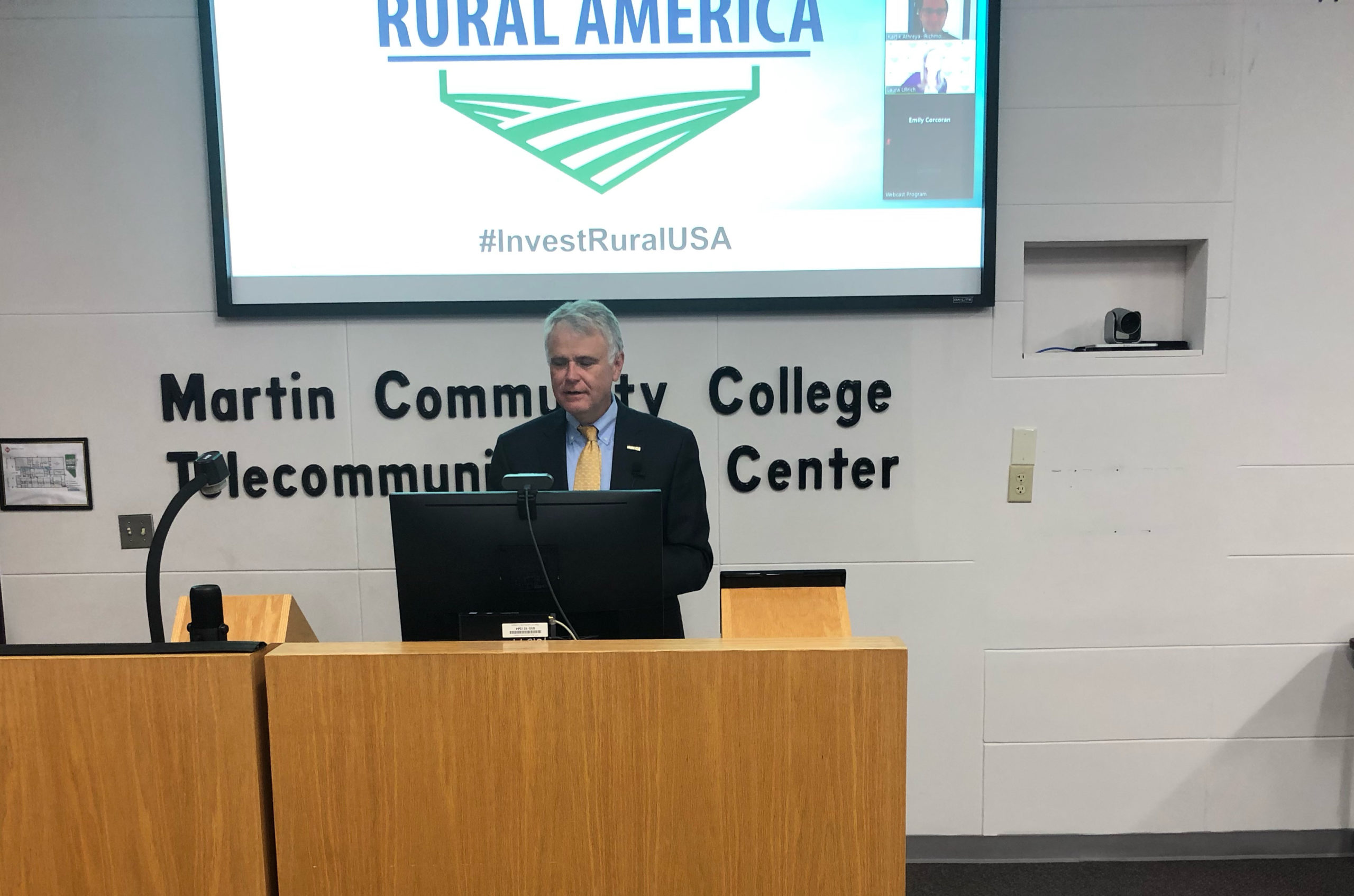
October 8, 2020
Today I had the opportunity to provide remarks for the keynote session of the Investing in Rural America Conference hosted by the Federal Reserve Bank of Richmond. The conference focused on the impacts of COVID-19, the changing role of higher education institutions, as well as labor market outcomes.
The conference made the transition online earlier this summer as a result of the pandemic. Martin Community College graciously offered the use of a room equipped with state-of-the-art technology to allow me to address the conference participants.
My remarks focused on the four key habits of successful resilient communities. Resilience is daily work over the long term to move the needle little by little, focusing on each component of the strategy to eventually reach the goals.
This concept isn’t new. Before there were computers, heavy machinery, cars, planes, cell phones, the internet, and modern materials, construction projects took years. For example, the Cologne Cathedral located in Germany took 600 years to build. The people that designed it and laid the cornerstone were certainly not around to see it completed. Someone had to start it, and everyone had to stick to it, in order for this beautiful building to exist today.
The community of Cologne came together and through generations made this cathedral the tallest twin-spired church in the world and the second tallest church in Europe. This was resilient through economic hardships, leadership changes and changing dynamics. The community made its long-term goal a reality.
Focus
Resilient communities focus on doing a few key things that align with the needs of their community, and do those things well. Every single community has something. Some communities may have several things. But every community has at least one thing that is an asset that can be leveraged.
When you think about your community assets, I encourage you to think beyond community borders and about ways to develop a regional strategy to leverage those assets. Some assets may be 50 miles away and others are downtown on Main Street.
I shared several examples of successful long-term regional economic development projects that began as an effort to leverage their existing assets:
- Pennsylvania Wilds
- Virginia’s Crooked Road
- Ohio’s Winding Road
- Outdoor Gear Builders of Western North Carolina
- Frontier Warren
The first, and one of the most critical aspects of strategy development, is this focus on identifying the assets already in the community and developing a strategy to enhance those key assets to reach your goals. A resilient community will focus on the good, despite the bad, and intentionally focus on the good. No matter if your goal is bringing back a lost population, recruiting new industry, or growing and sustaining your existing industry, begin with a focus on the good.
Act
Once the strategy is developed, successful resilient communities do not wait for help. They take action to help themselves. They start with the first step, the smallest possible bite, and with what can be done with the amount of funding available. This does not always mean new resources, either. Resources can be refocused away from what is not working to what can work. In order for long lasting resilience to work, locally there must be buy in. If a community is not invested in the success of an idea, then the chance of that idea failing increases dramatically.
At Golden LEAF, we look at the local backing of a project, including both financial and in-kind support. I do not like to use the word grant. Because it implies that we are not looking for a return on that investment. It implies that it would not matter to us if an idea failed. This is wrong on several fronts, but most importantly that for any dollar that is provided for a project where the local community is not invested, that is a dollar that could have gone elsewhere and had an impact. Our mission is to move the economic needle, and we take that mission seriously.
Exalt
Successful communities build leaders. Many of you are the key policy makers and change agents for your communities, today. For strategies to matter in the long term, it cannot be about an individual if the goal is to be achieved. It is always easier said than done, but the slow, long-term nature of strategic goals require that the mantle be passed from generation to generation. Resiliency cannot depend on one person or a small group. For a strategy to be successful, it cannot be about who did the work, but that the work actually gets done.
Forgive
And once it is done, forgive all the trials and tribulations that it took to get there. Resilience is only rewarding if you are willing to let go of the past.
There are many communities where you will hear that 50 years ago a decision was made to build a road here or move the water treatment plant there and those that were there have passed the stories down to the next generation as the justification for a turf battle. I promise, none of the new businesses or industries recruited to your community will be worried about the history of why this road goes there or who decided where to put what. If a business is choosing to locate in your community, to bring new jobs and better employment opportunities for your residents, then it is because your overall strategy is working.
Each of you and your communities are able to recover from this shock and become more resilient by practicing these four habits daily: Focus. Act. Exalt. Forgive.